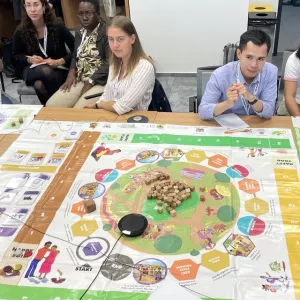How can a board game promote agroecology? Experts experience the Happy Family Board Game at the 2022 Tropentag Conference
What would you choose to invest in: a kitchen garden, a cow, visit to a clinic, fruit tree, seeds or school fees? The 2022 Tropentag Conference, held on 14-16 September at the Czech University of Life Sciences, Prague, zoomed in on the role of agroecology in feeding the world. Using a myriad of approaches, the conference reviewed recent research results

How can a board game promote agroecology? Experts experience the Happy Family Board Game at the 2022 Tropentag Conference
What would you choose to invest in: a kitchen garden, a cow, visit to a clinic, fruit tree, seeds or school fees?
The 2022 Tropentag Conference, held on 14-16 September at the Czech University of Life Sciences, Prague, zoomed in on the role of agroecology in feeding the world. Using a myriad of approaches, the conference reviewed recent research results that address challenges facing global food production from the points of view of the researchers, farmers, development workers among other players.
Within the scope of this theme, Africa-based researchers from the Food Environment and Consumer Behavior research area of the Alliance of Bioversity and CIAT collaborated with the EaTSANE project team to organize a pre-conference workshop linking agroecological practices, dietary practices and human health. The workshop participants were invited to play “The Happy Family Board Game”, an innovation of the EaTSANE project which combines key lessons learned from an interdisciplinary participatory research to mimic the real-life occurrences of a typical East-African smallholder farmer.
A game to understand families’ choices
The goal of the board game is to show the interconnectedness of households’ decisions in agriculture, nutrition and value chains, in a playful way. Why use a board game? Research has shown that board games, which can be educational tools for both adults and children, may influence consumer behavior by enhancing the interpersonal interactions and motivation of participants as well as developing decision-making skills. In short, players can be better equipped to minimize any potential negative consequences that surround their daily life choices.
The workshop attracted 21 diverse online and in person participants, and was facilitated by five experts with various backgrounds including soil scientist, gender expert and a nutritionist. Irmgard Jordan, a CIM Expert at the Alliance and part of the team that developed the game at the EaTSANE project, described the game to the workshop participants as being about building synergies and promoting co-creation of knowledge.

